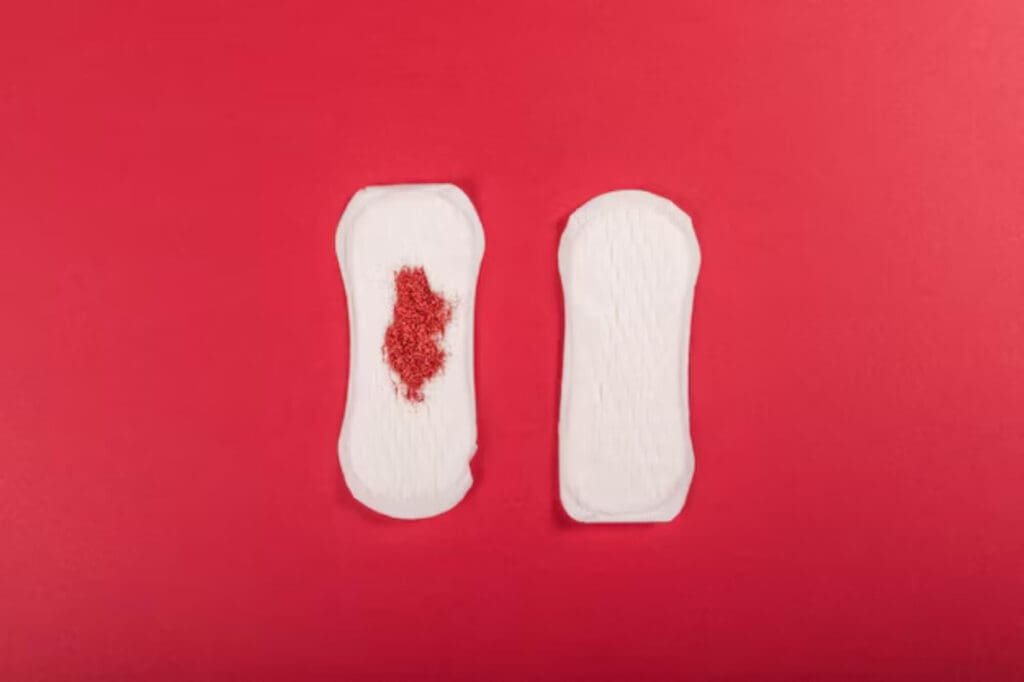
How Much Blood is Normal During Your Period?
If you’ve ever found yourself wondering, “Am I losing too much blood during my period?” or “Is my flow normal?”—you’re not alone. It’s common to question the amount of blood during your period. Some days might feel heavier, while others months seem lighter.
This blog will help you understand what’s considered typical, what’s not, and when you might need to check in with a healthcare provider.
How much blood do you actually lose?
On average, women lose between 20 to 90 millilitres (ml) of blood during their period. To put that into perspective, 80 ml is roughly 5 tablespoons over the course of your entire cycle. For most women, the majority of bleeding happens during the first couple of days, and it gradually lightens.
It’s worth noting, however, that measuring exactly how much blood you lose during your period is challenging. Instead, there are signs that can help you gauge whether your bleeding is within a typical range or if it might indicate heavy menstrual bleeding, known as menorrhagia.
Keep in mind, your period isn’t just blood — it’s a combination of blood, endometrial tissue, cervical mucus, vaginal secretions and other bodily fluids.
In terms of how that translates into the products you use. It’s estimated that:
- A regular pad or tampon holds around 5 ml of fluid.
- A super pad or tampon can hold up to 10ml.
- Menstrual cups vary but generally hold between 15 to 30 ml depending on the brand.
What is considered a light period?
A light period, also known as hypomenorrhea, may involve losing less than 30 ml of blood throughout your period. This might look like light spotting or barely needing to change your pad or tampon. If you’ve always had light periods and you’re not experiencing any pain or discomfort, there’s likely nothing to worry about. But, if your periods suddenly become very light or irregular, it’s worth seeing a doctor to rule out hormonal imbalances, stress, or conditions like polycystic ovary syndrome (PCOS).
What is considered a heavy period?
A heavy period, or menorrhagia, is defined as losing more than 80 ml of blood throughout your cycle. If you find yourself:
- bleeding longer than seven days each time you have your period,
- soaking through sanitary protection (pads or tampons) regularly, often needing to change every 1-2 hours during your heaviest days,
- waking up at night to manage your flow,
- passing large blood clots, larger than a coin (around the size of a quarter),
- affecting your daily activities, work, or emotional well-being.
It’s important to remember that the UK NICE guidance emphasises the impact on quality of life as a major factor in diagnosing and managing heavy menstrual bleeding. Many women with menorrhagia experience fatigue, disruptions to their daily routines, and psychological or emotional strain, making it more than just a physical concern.
Heavy periods can make daily life uncomfortable and could be a sign of underlying health issues such as:
- Uterine fibroids
- Thyroid disorders
- Endometriosis/Adenomyosis
- Endometrial polyps
- Blood disorders
- Infection
- Perimenopause
- Cancer
If you suspect your periods are abnormally heavy, or feel that your cycle is affecting your quality of life, it’s a good idea to see your healthcare provider to rule out any underlying causes and find ways to manage your flow better.
What are blood clots?
Blood clots during your period can look alarming, but they’re actually pretty common. You can learn more about them here. In short, clots typically form when your blood pools in the uterus before passing through the cervix. Most clots are no larger than a 10p coin and are usually nothing to worry about. However, if you notice frequent, large clots or experience extreme pain, it could indicate a medical issue such as fibroids or adenomyosis, and you should seek medical advice.
What is normal for you?
What’s “normal” varies from woman to woman. For some, a light three-day period might be their usual. While, others may have a five- to seven-day flow that feels heavy. The key is to know your body and notice what’s typical for you. If you experience sudden changes in your flow—whether it becomes significantly heavier or lighter—or if you’re experiencing extreme pain or discomfort, it’s worth having a conversation with your doctor.
Tips for managing your flow
If you have a heavy or light period, these tips can help you manage it more comfortably:
- Use the right menstrual products: For heavy flow days, consider using super-absorbent pads or tampons. Menstrual cups can also handle a larger volume of blood.
- Stay hydrated: Dehydrated can sometimes make clots worse. Make sure you’re drinking plenty of water to help replenish blood loss, ease cramping and reduce bloating.
- Eat iron-rich foods: Heavy periods can lead to iron deficiency. Try to include iron-rich foods like spinach, lentils and red meat in your diet to keep your energy levels up.
- Rest and relaxation: Never underestimate the power of rest. Heavy periods can be exhausting! Give yourself enough time to rest, especially if your bleeding is heavier than usual.
- Over-the-counter pain relief: Anti-inflammatory painkillers like ibuprofen can help reduce the heaviness of your flow and ease cramping.
- Track your cycle: Using our app to track your cycle can help you note when clots appear and how heavy your periods are. This information can be helpful if you need to consult a doctor.
In addition to these tips, it’s worth considering treatment options if heavy periods are affecting your quality of life:
- Medications: There are non-hormonal medications that can be taken during your period to reduce blood loss.
- Hormonal treatments: Options like birth control pills or patch may help regulate your cycle and lighten your flow. These are often recommended for women with underlying hormonal imbalances.
- Iron supplements: Heavy bleeding can sometimes cause or worsen iron deficiency. It’s a good idea to have your iron levels checked, and if needed, take iron supplements under medical guidance.
- Invasive treatments: In more severe cases, or if there’s an underlying condition like fibroids, polyps, or endometriosis, more invasive treatments like surgery might be necessary. A healthcare provider can guide you on the best course of action.
Remember, if your period feels unmanageable or is impacting your daily life, consulting a healthcare professional is key. Understanding the underlying causes and exploring suitable treatments can help you find relief and improve your quality of life.
Final thoughts
By staying in tune with your body and knowing what’s normal for you, you can take proactive steps to manage your period and ensure your overall health. If you ever feel like something is off, don’t hesitate to seek medical advice! You deserve to feel confident and comfortable managing your period, and knowing what to expect is the first step.
Reviewed by Dr Hajra

